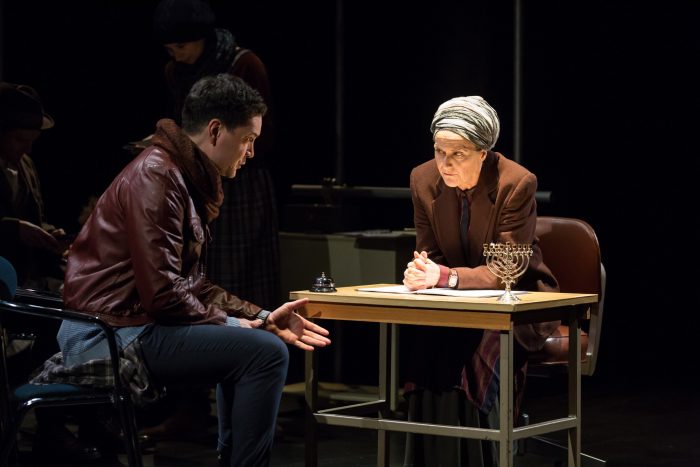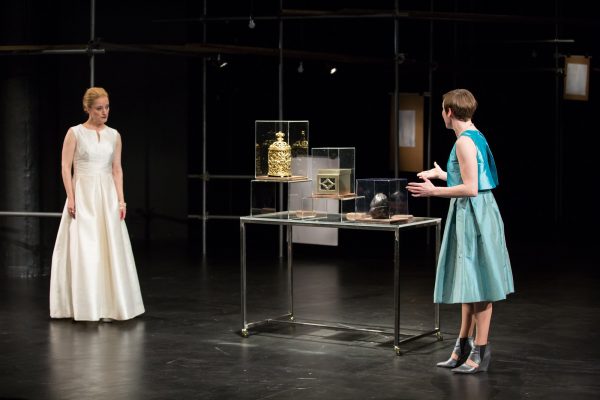Review: The Merchant of Venice by William Shakespeare. Produced by Seattle Shakespeare Company. Directed by Desdemona Chiang. Set Design by Shawn Ketchum Johnson. Costume Design by Christine Tschirgi. Lighting Design by Geoff Korff. Sound Design by Evan Mosher. Properties Design by Robin Macartney. With Sharon Barto Gouran, Trick Danneker, Lindsay W. Evans, Tim Gouran, Kevin Kelly, Darragh Kennan, Katya Landau, Carter Rodriquez, Jason Sanford, Richard Nguyen Sloniker, Zachary Taxdahl, Jen Taylor, Amy Thone, Carlos Wagener-Sobrero. Now through April 15, 2018 at Center House Theatre at Seattle Center.

Richard Nguyen Sloniker and Amy Thone in Seattle Shakespeare Company’s “The Merchant of Venice”. Photo by HMMM Productions.
Since I HATE summarizing plays/works that are already very well known (’cause any semi-intelligent/educated person should REALLY know these things already…) and since Seattle Shakespeare Company has done an excellent job of giving a basic overview of Shakespeare’s The Merchant of Venice their current production on stage at the Center House Theater at Seattle Center, we’re just going to use it here:
Kings of Commerce. The wealthy heiress Portia is forced to set her suitors a challenge for her hand in marriage. In order to woo her, Bassanio finances his plan with money borrowed from his friend Antonio, (a Venetian Merchant). All would be fine except Antonio has taken out a loan from the (Jewish) moneylender Shylock on the assurance that his ships will make it back to the city. They don’t, and Shylock demands repayment with a pound of Antonio’s flesh.
A Tough, Multi-faceted Jewel. The diverse and vibrant city of Venice comes alive in Shakespeare’s interconnected tales of friendship, love, family, business, and intolerance. Complex and memorable characters grapple with formidable issues. This play is wondrous lens in which to scrutinize racism, justice, mercy, antisemitism, sexism, economic marginalization, religious law, and civil society.
I did add some more info, in parenthesis up above because it’s important to know that Antonio is actually the title character; he IS the “Merchant of Venice” and thus the title character although he’s not actually the main character in a multi-character plot that has more threads than a 20 episode continuing drama series on Netflix. (And, I’ll digress for a moment to state my belief that if Bill Shakespeare were alive today, he’d totally be creating/producing complex shows for Netflix and Hulu and probably not writing much for the stage because frankly, “The Sopranos”, “Breaking Bad” and “The Handmaid’s Tale” are more relevant and reach more people than anything in live theater.)
I also added the descriptor “Jewish” to describe Shylock, the most well known character in The Merchant of Venice because that aspect of the character is central and key to Shylock’s role and place of purpose in the play. Originally written and staged as a romantic comedy, with Shylock relegated to the slot of “comic villain”, the way the play is staged has changed drastically over the centuries as the anti-semitism and bigotry displayed towards Shylock and Jewish people in general has become less and less acceptable. Though Shakespeare does give the character a sense of humanity, and one of the most beautiful speeches in the canon with the famous “Hath not a Jew eyes?” speech delivered by Shylock in defense of his people, it’s still basically a night of Jew baiting and hatred.
The modern tendency is to play up the humanity of Shylock and make him sympathetic albeit flawed. Seattle Shakespeare Company has done a fine job with that approach, mostly due to the thoughtful direction of Desdemona Chiang who has quite consciously staged the play to give Shylock a sense of dignity and to make clear the horror of how the character is treated.
You might have noticed I’ve made a point to avoid any gendered pronouns in regard to Shylock and that’s because the traditionally male cast character is here played by veteran actress Amy Thone with Shylock as female identified and with the script being adapted to refer to the character by female pronouns. The gender change works well here, mostly due to Thone’s gift as an actor and Chiang’s as a director, and by casting a woman in the role, it also empowers Shylock with more humanity and sympathy. This is especially so in the scene, late in the play, where Shylock is forced to become Christian as punishment for alleged crimes committed by the character. Here, Desdemona Chiang has directed other characters to rip off the traditional head covering worn by most orthodox Jewish woman, and one worn by Amy Thone in her portrayal of the character. It’s a devastating and shocking act of physical violence, akin to watching someone being raped as they are stripped of their faith, their dignity and their cultural heritage and persona. It’s a strong and powerful stage moment.
It’s just one of several strong moments in this production which can be attributed to Shakespeare’s writing obviously: The Merchant of Venice is one of his richest and most densely written plays with complex characterizations, unique and multi-layered plotting and some of his most famous speeches and lines. But, the play also feels a bit schizoid at times with so many different plots all running concurrently. There’s Shylock as a comic villain but also Shylock as passionate victim of intolerance…there’s the humor and charm of Portia dealing with multiple wooers for her hand and fortune and Bassanio’s ultimately successful winning of her hand, heart and fortune….there’s also two more romantic couples to deal with plus the melancholic despair of the Merchant himself, Antonio who seems a tad resigned to losing his “pound of flesh”. AND, the usual Shakespearean tricks of disguises, fake identities and trouble making servants. There’s a lot of contrasting balls to keep afloat but Chiang’s staging keeps it all appropriately paced and well integrated even when it’s hard to weave together threads of such disparate natures….comic wooing and intolerance are a troublesome pair.
The actors are all mostly seasoned veterans of Seattle Shakespeare productions with Ms Thone a captivating Shylock, bitterly sly but also compellingly human. There was a tendency at times to use her lower register with some rapid dialogue and the result was a bit mumble-y at times and harder to understand, though certainly character appropriate for a suspicious sort that verges on the miserly. Jen Taylor as Portia and Richard Nguyen Sloniker’s Bassanio were appropriately romantic and charming in their roles as the main lovers with Ms Taylor nicely playing the usual “Shakespeare Character in Disguise” bit with great gusto.
Tim Gouran as Bassanio’s mouthy comic sidekick Gratiano was a chief highlight as was his romantic counterpart Nerissa charmingly played by Lindsay W. Evans. Carter Rodriquez humorously captured several smaller roles and Jason Sanford and Carlos Wagener-Sobrero had fun as two of Portia’s vainglorious failed suitors.
The actual “merchant” of the title, Antonio, is a bit of a buzzkill role…the character is fretful, depressed and melancholy throughout most of the play and if we’re being honest, not much fun to be around. He’s necessary to the plot and veteran Shakespeare actor Darragh Kennan is fine in the role but…how much fun is it to play the Sad Sack character?
It’s your usual pretty basic Seattle Shakespeare design that gets the job done with Christine Tschirigi’s clever modern takes on appropriate period clothing being fashion forward and fun.
The anti-semiticism of the play is very hard to stomach today but The Merchant of Venice is rightfully one of Shakespeare’s strongest works with some of his most intricate plotting and characters that fascinate. Like The Taming of the Shrew’s palpable misogny, “Venice” is one of Shakespeare’s problematic works that we have to buckle up for…historically painful treatment of marginalized groups is hard to watch but it’s important to remember that it happened and put it into proper historical, cultural and artistic perspectives. The strength of Seattle Shakespeare’s production, makes this “Merchant” much easier to appreciate and value.



















